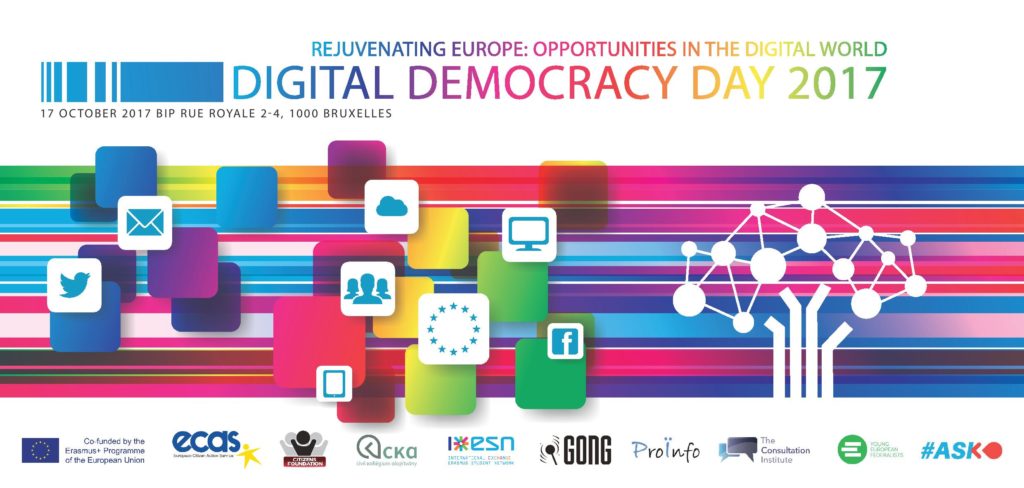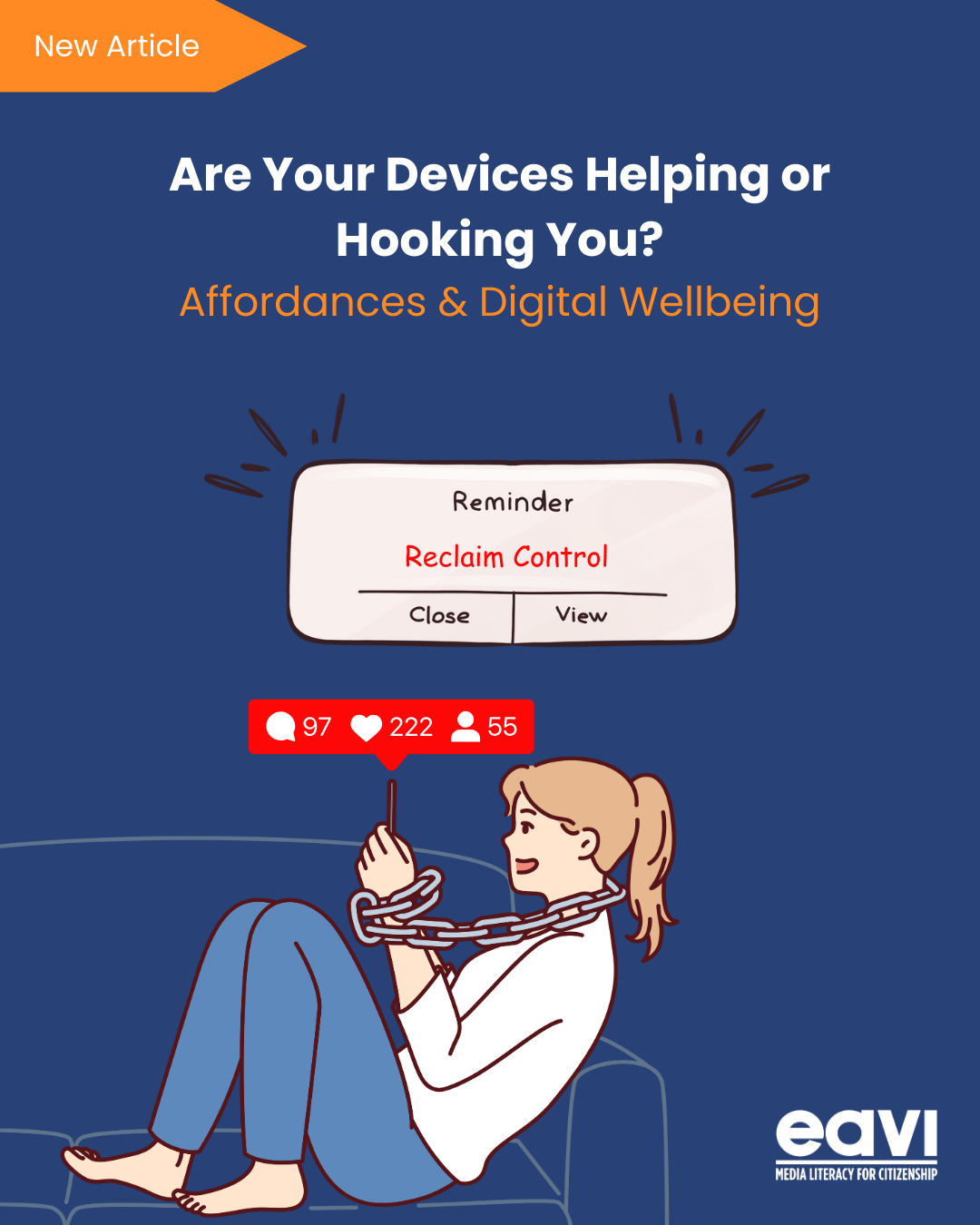 EAVI at ECAS Digital Democracy Day 2017
EAVI at ECAS Digital Democracy Day 2017
On 17 October 2017, ECAS (European Citizen Action Service) held their Digital Democracy Day 2017 event. The event focused on young people’s e-participation. It was attended by several organisations including EAVI as an active partner, and also MEP Brando Benifei and Villu Varjas (Permanent Representation of Estonia to the EU).
The focus of discussion was whether millennials (born between 1982-2002) participate with and are committed to politics and social issues. Although this generation is sceptical and reluctant to get involved in politics, they are very interested and active within their spheres. However, they have disengaged from the traditional political process. This is further exacerbated by politicians who do not know how to engage and attract young people.
According to the Maria Freitas, Policy Advisor on FEPS (Foundation for European Progressive Studies), Millennials are very interested in social issues and politics, but they don’t trust the system anymore. Among the reasons why Millennials have lost their faith, Freitas highlights, are politicians’ broken promises and a lack of relationship between politicians and young people.
Nevertheless, Millennials are optimistic; they look for opportunities to contribute where the system has failed them. They are passionate about supporting the causes they consider worthy and important. Millennials are very interested in doing as much as possible to do a positive impact in the society, they are just sceptical about “traditional democratic processes”. A further, live issue which impacts Millennials’ participation in public life is related to their top worries and fears: getting a job, accessing health services, accessing education and the pursuit of equality.
The conference discussed Millennials as digital natives, who operate on digital platforms – and this is where their political and social lives take place. What begins as a discourse on blogs and social networks ends in real-world action. This makes blogs and social networks not distractions from real-world issues, but also tools to affect change.
However, digital participation does not necessarily translate to meaningful participation. Not everything that is shared is relevant, helpful or true. There is a lot of misinformation and disinformation circulating around the digital sphere – and this too has real-world impact.
The term “Millennials” refers only to the generation born between 1982 and 2002. Within this generation, like any other, are a number of cultures and sub-cultures, and also living different phases of their lives. Older Millennials are 35 years old, having children, struggling to buy homes and settling into careers, while the younger cohort are not even finishing school and emerging into the wider world. It is therefore inaccurate to expect a comparable level of awareness from teenagers as adults. Stereotypes might be true of many sub-categories of Millennial, but not of all. Strategies to engage them must be as diverse as they are.
As ECAS Digital Democracy Manager Elisa Lironi, said: “Creating tools for youth participation doesn’t mean they are going to use them”. Millennials must take their share of responsibility of their inactivity in politics and social initiatives. If, on one hand, politicians do not meet their expectations, on the other one Millennials are not using the resources that are being created for them.
At this point it’s clear that even if Millennials have their reasons for being sceptical of current political environment, this generation must make a greater effort to challenge the stereotypes and labels attached to them.
The conference found that scepticism can only be overcome by participation. While it is true that Millennials are vocal outside the traditional political structure, and the structure must change to accommodate them, Millennials must also take responsibility to address their alienation, and must not confuse alike and a share for actual participation and engagement. They must translate their awareness and anxieties into positive, real-world impact in their communities and countries.
 EAVI at ECAS Digital Democracy Day 2017
EAVI at ECAS Digital Democracy Day 2017
On 17 October 2017, ECAS (European Citizen Action Service) held their Digital Democracy Day 2017 event. The event focused on young people’s e-participation. It was attended by several organisations including EAVI as an active partner, and also MEP Brando Benifei and Villu Varjas (Permanent Representation of Estonia to the EU).
The focus of discussion was whether millennials (born between 1982-2002) participate with and are committed to politics and social issues. Although this generation is sceptical and reluctant to get involved in politics, they are very interested and active within their spheres. However, they have disengaged from the traditional political process. This is further exacerbated by politicians who do not know how to engage and attract young people.
According to the Maria Freitas, Policy Advisor on FEPS (Foundation for European Progressive Studies), Millennials are very interested in social issues and politics, but they don’t trust the system anymore. Among the reasons why Millennials have lost their faith, Freitas highlights, are politicians’ broken promises and a lack of relationship between politicians and young people.
Nevertheless, Millennials are optimistic; they look for opportunities to contribute where the system has failed them. They are passionate about supporting the causes they consider worthy and important. Millennials are very interested in doing as much as possible to do a positive impact in the society, they are just sceptical about “traditional democratic processes”. A further, live issue which impacts Millennials’ participation in public life is related to their top worries and fears: getting a job, accessing health services, accessing education and the pursuit of equality.
The conference discussed Millennials as digital natives, who operate on digital platforms – and this is where their political and social lives take place. What begins as a discourse on blogs and social networks ends in real-world action. This makes blogs and social networks not distractions from real-world issues, but also tools to affect change.
However, digital participation does not necessarily translate to meaningful participation. Not everything that is shared is relevant, helpful or true. There is a lot of misinformation and disinformation circulating around the digital sphere – and this too has real-world impact.
The term “Millennials” refers only to the generation born between 1982 and 2002. Within this generation, like any other, are a number of cultures and sub-cultures, and also living different phases of their lives. Older Millennials are 35 years old, having children, struggling to buy homes and settling into careers, while the younger cohort are not even finishing school and emerging into the wider world. It is therefore inaccurate to expect a comparable level of awareness from teenagers as adults. Stereotypes might be true of many sub-categories of Millennial, but not of all. Strategies to engage them must be as diverse as they are.
As ECAS Digital Democracy Manager Elisa Lironi, said: “Creating tools for youth participation doesn’t mean they are going to use them”. Millennials must take their share of responsibility of their inactivity in politics and social initiatives. If, on one hand, politicians do not meet their expectations, on the other one Millennials are not using the resources that are being created for them.
At this point it’s clear that even if Millennials have their reasons for being sceptical of current political environment, this generation must make a greater effort to challenge the stereotypes and labels attached to them.
The conference found that scepticism can only be overcome by participation. While it is true that Millennials are vocal outside the traditional political structure, and the structure must change to accommodate them, Millennials must also take responsibility to address their alienation, and must not confuse alike and a share for actual participation and engagement. They must translate their awareness and anxieties into positive, real-world impact in their communities and countries.
 EAVI at ECAS Digital Democracy Day 2017
EAVI at ECAS Digital Democracy Day 2017
On 17 October 2017, ECAS (European Citizen Action Service) held their Digital Democracy Day 2017 event. The event focused on young people’s e-participation. It was attended by several organisations including EAVI as an active partner, and also MEP Brando Benifei and Villu Varjas (Permanent Representation of Estonia to the EU).
The focus of discussion was whether millennials (born between 1982-2002) participate with and are committed to politics and social issues. Although this generation is sceptical and reluctant to get involved in politics, they are very interested and active within their spheres. However, they have disengaged from the traditional political process. This is further exacerbated by politicians who do not know how to engage and attract young people.
According to the Maria Freitas, Policy Advisor on FEPS (Foundation for European Progressive Studies), Millennials are very interested in social issues and politics, but they don’t trust the system anymore. Among the reasons why Millennials have lost their faith, Freitas highlights, are politicians’ broken promises and a lack of relationship between politicians and young people.
Nevertheless, Millennials are optimistic; they look for opportunities to contribute where the system has failed them. They are passionate about supporting the causes they consider worthy and important. Millennials are very interested in doing as much as possible to do a positive impact in the society, they are just sceptical about “traditional democratic processes”. A further, live issue which impacts Millennials’ participation in public life is related to their top worries and fears: getting a job, accessing health services, accessing education and the pursuit of equality.
The conference discussed Millennials as digital natives, who operate on digital platforms – and this is where their political and social lives take place. What begins as a discourse on blogs and social networks ends in real-world action. This makes blogs and social networks not distractions from real-world issues, but also tools to affect change.
However, digital participation does not necessarily translate to meaningful participation. Not everything that is shared is relevant, helpful or true. There is a lot of misinformation and disinformation circulating around the digital sphere – and this too has real-world impact.
The term “Millennials” refers only to the generation born between 1982 and 2002. Within this generation, like any other, are a number of cultures and sub-cultures, and also living different phases of their lives. Older Millennials are 35 years old, having children, struggling to buy homes and settling into careers, while the younger cohort are not even finishing school and emerging into the wider world. It is therefore inaccurate to expect a comparable level of awareness from teenagers as adults. Stereotypes might be true of many sub-categories of Millennial, but not of all. Strategies to engage them must be as diverse as they are.
As ECAS Digital Democracy Manager Elisa Lironi, said: “Creating tools for youth participation doesn’t mean they are going to use them”. Millennials must take their share of responsibility of their inactivity in politics and social initiatives. If, on one hand, politicians do not meet their expectations, on the other one Millennials are not using the resources that are being created for them.
At this point it’s clear that even if Millennials have their reasons for being sceptical of current political environment, this generation must make a greater effort to challenge the stereotypes and labels attached to them.
The conference found that scepticism can only be overcome by participation. While it is true that Millennials are vocal outside the traditional political structure, and the structure must change to accommodate them, Millennials must also take responsibility to address their alienation, and must not confuse alike and a share for actual participation and engagement. They must translate their awareness and anxieties into positive, real-world impact in their communities and countries.








































































































































































